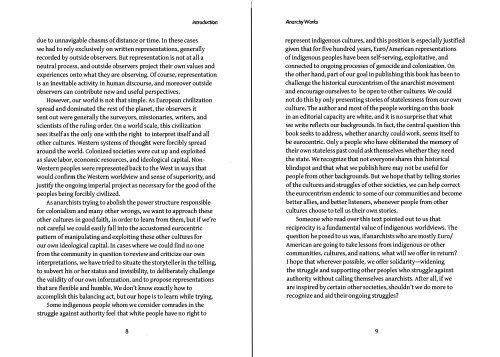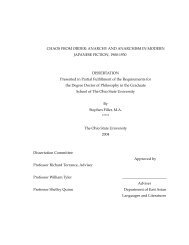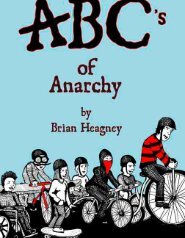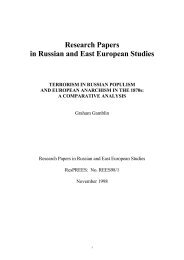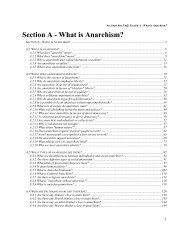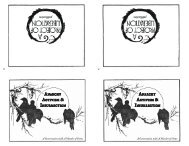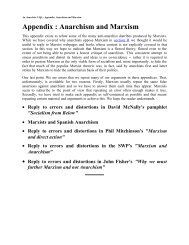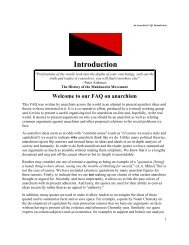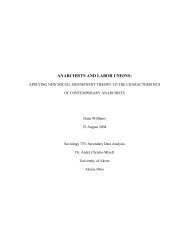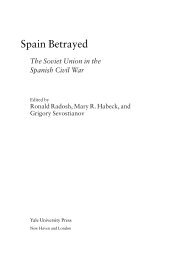Anarchy Works.pdf - Infoshop.org
Anarchy Works.pdf - Infoshop.org
Anarchy Works.pdf - Infoshop.org
Create successful ePaper yourself
Turn your PDF publications into a flip-book with our unique Google optimized e-Paper software.
introduction<br />
<strong>Anarchy</strong> <strong>Works</strong><br />
due to unnavigable chasms of distance or time. In these cases<br />
we had to rely exclusively on written representations, generally<br />
recorded by outside observers. But representation is not at all a<br />
neutral process, and outside observers project their own values and<br />
experiences onto what they are observing. of course, representation<br />
is an inevitable activity in human discourse, and moreover outside<br />
observers can contribute new and useful perspectives.<br />
However, our world is not that simple. As European civilization<br />
spread and dominated the rest of the planet, the observers it<br />
sent out were generally the surveyors, missionaries, writers, and<br />
scientists of the ruling order. On a world scale, this civilization<br />
sees itself as the only one with the right to interpret itself and all<br />
other cultures. Western systems of thought were forcibly spread<br />
around the world. Colonized societies were cut up and exploited<br />
as slave labor, economic resources, and ideolOgical capital. Non<br />
Western peoples were represented back to the West in ways that<br />
would confirm the Western worldview and sense of superiority, and<br />
justify the ongoing imperial project as necessary for the good of the<br />
peoples being forcibly civilized.<br />
As anarchists trying to abolish the power structure responsible<br />
for colonialism and many other wrongs, we want to approach these<br />
other cultures in good faith, in order to learn from them, but if we're<br />
not careful we could easily fall into the accustomed eurocentric<br />
pattern of manipulating and exploiting these other cultures for<br />
our own ideological capital. In cases where we could find no one<br />
from the community in question to review and criticize our own<br />
interpretations, we have tried to situate the storyteller in the telling,<br />
to subvert his or her status and invisibility, to deliberately challenge<br />
the validity of our own information, and to propose representations<br />
that are flexible and humble. We don't know exactly how to<br />
accomplish this balancing act, but our hope is to learn while trying.<br />
Some indigenous people whom we consider comrades in the<br />
struggle against authOrity feel that white people have no right to<br />
represent indigenous cultures, and this position is especially justified<br />
given that for five hundred years, Euro! American representations<br />
of indigenous peoples have been self-serving, exploitative, and<br />
connected to ongoing processes of genocide and colonization. On<br />
the other hand, part of our goal in publishing this book has been to<br />
challenge the historical eurocentrism of the anarchist movement<br />
and encourage ourselves to be open to other cultures. We could<br />
not do this by only presenting stories of statelessness from our own<br />
culture. The author and most of the people working on this book<br />
in an editorial capacity are white, and it is no surprise that what<br />
we write reflects our backgrounds. In fact, the central question this<br />
book seeks to address, whether anarchy could work, seems itself to<br />
be eurocentric. Only a people who have obliterated the memory of<br />
their own stateless past could ask themselves whether they need<br />
the state. We recognize that not everyone shares this historical<br />
blindspot and that what we publish here may not be useful for<br />
people from other backgrounds. But we hope that by telling stories<br />
of the cultures and struggles of other societies, we can help correct<br />
the eurocentrism endemic to some of our communities and become<br />
better allies, and better listeners, whenever people from other<br />
cultures choose to tell us their own stories.<br />
Someone who read over this text pointed out to us that<br />
reciprocity is a fundamental value of indigenous worldviews. The<br />
question he posed to us was, if anarchists who are mostly Euro!<br />
American are going to take lessons from indigenous or other<br />
communities, cultures, and nations, what will we offer in return?<br />
I hope that wherever pOSSible, we offer solidarity-widening<br />
the struggle and supporting other peoples who struggle against<br />
authority without calling themselves anarchists. After all, if we<br />
are inspired by certain other societies, shouldn't we do more to<br />
recognize and aid their ongoing struggles?<br />
8<br />
9


